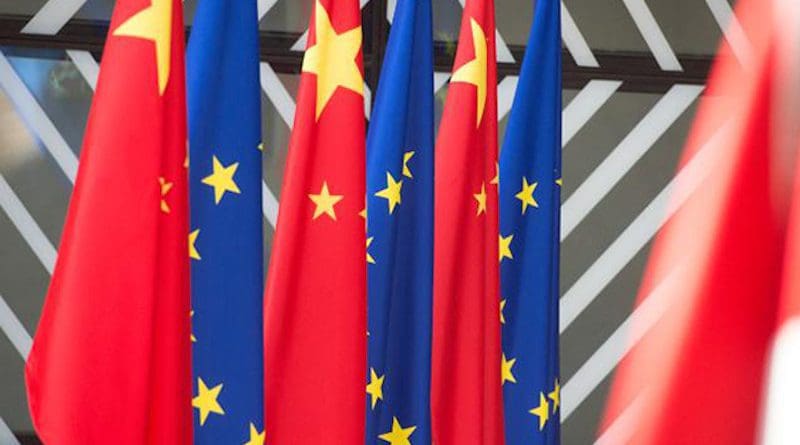EU Tells China ‘Not To Interfere’ With Russia Sanctions
By EurActiv
By Alexandra Brzozowski
(EurActiv) — EU leaders said on Friday (1 April) they had told their Chinese counterparts during a virtual summit that they expect Beijing to help end Russia’s war in Ukraine or, at the very least, ‘not to interfere’ with international sanctions imposed on Moscow.
“We expect China, if not supporting the sanctions [against Russia], at least to do everything not to interfere in any kind,” European Commission President Ursula von der Leyen told reporters after Friday’s meeting.
“On that point, we were very clear,” she said, adding that the EU expected China to use its influence on Russia to end the war in Ukraine.
European Council President Charles Michel stressed that “any attempts to circumvent sanctions or provide aid to Russia would prolong the war. This would lead to more loss of life and greater economic impact”.
“We will also remain vigilant on any attempts to aid Russia financially or militarily. However, positive steps by China to help end the war would be welcomed by all Europeans and by the global community,” Michel added.
“We asked China to help end the war in Ukraine,” he said. “China cannot ignore Russia’s violation of international law.”
The comments came after a two-hour conversation with China’s Premier Li Keqiang and a video call of less than one hour with President Xi Jinping.
EU urges China to push for peace
Beijing has so far abstained from United Nations Security Council resolutions on the invasion and has sided with Russia rhetorically, echoing many of Moscow’s talking points.
Over the past weeks, Chinese officials and state media have blamed NATO for the war in Ukraine, with Foreign Minister Wang Yi describing the country’s friendship with Russia as ‘rock-solid’.
According to experts, Beijing fears that the Ukraine war will bring Europeans and Americans even closer together.
One of the most often cited explanations for why China is still siding with Russia despite the atrocities in the Ukraine war is the hope of being able to continue to join forces with its “strategic partner” in the future against the US.
Meanwhile, European leaders last week received what senior EU officials called “very reliable evidence” that Beijing is considering arms sales to Russia.
Speaking to the press, von der Leyen said China had offered no assurances to Brussels about its position on Russia’s war.
“Frank and open means that we exchanged very clearly opposing views,” von der Leyen said.
“China has an influence on Russia and therefore, we expect China to take its responsibility to end this war” and influence Moscow to seek a peaceful solution, she said.
If this would not be the case, von der Leyen warned that Beijing would suffer “major reputational damage” to the European public and its business environment if it sided with Moscow over Ukraine or refrained from taking a clearer stance.
“Equidistance is not enough,” she added.
China’s ‘own way’
According to a readout provided by China’s official Xinhua News Agency, Xi stressed the need for Beijing and Brussels to “play a constructive role in adding stabilising factors to a turbulent world”.
He also urged the EU to “form its own perception of China, adopt an independent China policy, and work with China for the steady and sustained growth of China-EU relations.”
China has been concerned that European countries are taking more hardline foreign policy cues from the United States and has previously called on the EU to “exclude external interference” from its relations with China.
According to Chinese state broadcaster CCTV, Premier Li told EU leaders in a two-hour session on Friday that Beijing would push for peace in “its own way” in Ukraine after Brussels pressed for assurances that China would not supply Russia with arms or help it circumvent Western sanctions.
Despite its political backing for Russia, China wants to work towards peace in Ukraine with the Europeans and the international community, Li told the EU leaders.
China has always sought peace and promoted negotiations and is willing to continue to play a constructive role together with the international community, he said, according to a Chinese readout of the summit.
Systemic rivalry
“The EU leadership has made its positions and expectations with regard to China’s approach to the war in Ukraine and China’s discriminatory practices vis-à-vis Lithuania very clear. But they also seem to not have received any significant response or assurances from Beijing,” Janka Oertel, European Council on Foreign Relation’s (ECFR) Director of our Asia Programme, commented after the meeting.
“The fact that Xi Jinping’s comments on the summit were published in Chinese state media already half-way through the summit underscores that there was a limited willingness to engage in an actual conversation,” she said.
Before the summit, EU officials had stressed the meeting would be far from being “business as usual” and more of a frank exchange of opposing view, especially over Ukraine.
“Systemic rivalry is a new reality,” Oertel said.

